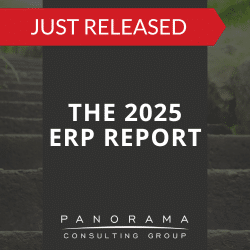If an ERP implementation were a hockey game, it would be one crowded ice rink. In the offensive zone, you’d have the core project team. On the scorer’s bench, you’d have the third-party consultants. And in the neutral zone, you’d have the independent software vendor (ISV).
While every project is different, it’s important to know some of the key players. One of the least understood players in this arena is the independent software vendor.
What do ISVs contribute, and when are they worth engaging? Today, we’re providing strategic insights for business leaders considering new ERP software and wondering who to bring onto the playing field.
What is an Independent Software Vendor?
An independent software vendor is a company specializing in making and selling software, designed to run on one or more computer hardware or operating system platforms.
Key Characteristics of ISVs
- Independence: They operate independently from hardware and operating system manufacturers.
- Specialization: They often focus on niche markets or specific functionalities within broader markets.
- Innovation: They add specialized features and functionality to a platform or device, offering more flexibility than large, generalized software providers.
While there are many types of ISVs, the remainder of this post will focus on vendors that operate in the ERP market.
2025 Clash of the Titans
SAP, Oracle, Microsoft, and Infor each have a variety of systems that can support data-driven decision-making. We surveyed customers of these four vendors to find out what their selection and implementation process was like.
The Role of ISVs in the ERP Ecosystem
1. Enhancing ERP Functionality
Independent software vendors develop specialized modules or applications that integrate with core ERP systems to address specific business requirements. This allows businesses to focus on their core competencies while relying on specialized vendors to handle complex software requirements.
For example, an ISV might develop an ERP module tailored for the healthcare industry, addressing specific regulatory requirements and operational needs that are not covered by generic ERP solutions. A healthcare organization might partner with this ISV instead of burdening internal IT resources with software customization demands.
2. Driving Innovation
Many ISVs develop solutions that leverage emerging technologies, like artificial intelligence (AI), the Internet of Things (IoT), and advanced analytics.
This continuous innovation helps organizations stay competitive and responsive to market changes.
For instance, an ISV might develop an AI-powered predictive maintenance application available in a cloud marketplace. A manufacturing company could use this application to analyze data from machinery and predict when maintenance is needed. Over time, the company could continuously improve these predictions as the software analyzes real-time inputs.
Other examples:
- Cloud-Based Solutions – ISVs are increasingly developing cloud-native applications that provide scalability, flexibility, and lower total cost of ownership. These solutions can be rapidly deployed and updated, ensuring that businesses always have access to the latest features and improvements.
- SaaS ERP Extensions – ISVs offering software-as-a-service (SaaS) extensions enable companies to enhance core ERP functionalities without extensive on-premise infrastructure.
3. Providing Support and Maintenance
Beyond providing software, many ISVs offer ongoing support and maintenance services. They typically offer various support packages, ranging from basic technical support to comprehensive managed services.
By offering these services, ISVs enable businesses to focus on their core operations without worrying about software maintenance and support.
For instance, a financial services company using an ISV-developed ERP module for regulatory compliance might rely on the vendor’s support team to ensure the software remains compliant with the latest regulations.
Challenges of Working with ISVs
1. Integration Issues
One of the primary challenges of working with ISVs is ensuring seamless integration between ISV solutions and your core ERP system. Incompatibilities can lead to data silos, operational inefficiencies, and increased complexity.
When our ERP consulting team oversees ERP implementations, we provide quality assurance (QA) on third parties, such as the systems integrator. This ensures that key technical activities are performed on time and on budget.
(Learn how to develop an ERP integration strategy.)
2. Vendor Dependency
Relying heavily on independent software vendors can lead to vendor dependency, where the business becomes reliant on the vendor for critical functionalities and support. This dependency can pose risks if the ISV fails to deliver or goes out of business.
To mitigate this risk, businesses should diversify their vendor portfolio and negotiate contracts that include service level agreements (SLAs) and contingency plans.
3. Security Concerns
Integrating third-party solutions with core ERP systems can introduce security vulnerabilities.
Conducting regular security audits and requiring vendors to comply with industry-standard security certifications can help mitigate this risk.
4. Cost Management
While ISVs can offer cost-effective solutions, managing costs associated with multiple ISV partnerships can be challenging. The total cost of ownership for each solution includes not only the initial purchase price but also ongoing costs such as maintenance, support, upgrades, and integration.
To effectively manage costs, businesses should negotiate favorable contract terms. Our contract negotiation services focus on the contract terms, such as implementation services, annual maintenance costs, licensing, and more.
Strategic Recommendations for Leveraging ISVs
1. Conduct a Comprehensive Needs Assessment
Before engaging an ISV partner, it’s important to identify your business requirements and pain points.
Action Steps:
- Gather input from various departments
- Identify gaps in current ERP functionalities and areas where ISV solutions can add value
- Prioritize needs based on your long-term business goals
2. Select an ISV with a Proven Track Record
Choosing the right ISV is critical to the success of your ERP implementation. Vendors should have proven expertise in your industry and a track record of successful implementations.
Action Steps:
- Request detailed case studies and customer testimonials from potential ISVs
- Contact references to learn about their experiences with the vendor’s solutions and support
- Evaluate the vendor’s industry knowledge and ability to address specific business challenges
3. Develop an Integration Strategy
ISV solutions should integrate seamlessly with your existing systems. It’s important to understand technical requirements, data flows, and potential challenges.
Action Steps:
- Collaborate with the vendor to map out integration touchpoints and data exchange mechanisms
- Conduct thorough testing to identify and resolve integration issues before full deployment
- Establish clear communication channels for ongoing support and troubleshooting
4. Monitor and Evaluate Performance
By tracking performance, you can verify that your new solutions are delivering expected benefits. Establishing key performance indicators (KPIs) is crucial in this context.
Ongoing assessment ensures that ISV solutions continue to align with your organization’s strategic objectives.
Action Steps:
- Define KPIs that align with business objectives
- Conduct periodic reviews to assess performance against these KPIs
- Gather feedback from users to identify areas for improvement and address any issues promptly
Final Takeaways for Executives
For executives embarking on a digital transformation, understanding the role of ISVs is crucial. By adopting an informed approach to ISV partnerships, executives can unlock new avenues for innovation and growth. From using advanced analytics to predict outcomes to integrating an industry-specific cloud application, there is a wide range of possibilities.
Contact our ERP consultants below to learn more.













